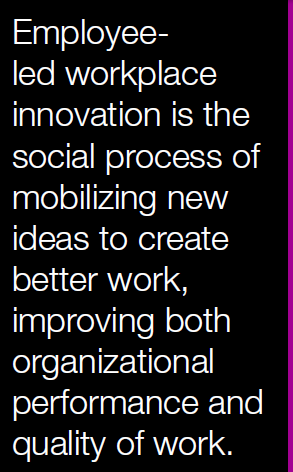The full results from our 2022-23 applied research project with Canada’s Future Skills Centre are now available on their website.
We’ve copied below the Executive Summary, as well as the Key Insights from the project. You can also download the full report, or read more on the FSC Site for these topics:
Executive Summary
The world is changing rapidly, and the way enterprises respond to those changes will have long-term consequences for economic competitiveness, social cohesion and environmental change. One way that enterprises are evolving is supporting employee-led workplace innovation – the social process of mobilizing new ideas to create better work, improving both organizational performance and quality of work.
With support from Workplace Innovation Europe, this project worked with a small sample of Canadian workplaces to adapt European research advances to improve quality of work through employee-led innovation. It also identified what European policy and program issues and initiatives should be explored further to guide Canadian initiatives to scale-up employee-led workplace innovation for quality of work.
The workplaces involved in the project aimed to use employee-led workplace innovation to increase retention and recruitment of particular groups of workers, adapt job roles to reflect skills needed to work with new technologies, and enhance an innovation-training program for employees, teams and organizations.
While successful, the project identified that employee-led workplace innovation can be resource intensive and identified a lack of supporting public policy for employee-led workplace innovation in Canada. However, the project also identified an opportunity for Canada to establish a competitive edge as both innovative and inclusive — making it more attractive for inbound investment by European companies seeking to establish jobs and facilities in North America that provide good quality of work.
Key Insights
Evidence shows that workplace innovation leads to improvements in firm performance and increases employee motivation and well-being – reducing stress, enhancing job satisfaction and mental health, and improving retention.
Workplace innovation can foster inclusive workplaces — and vice versa. For example, increasing the diversity of ways of thinking within an innovation team can increase the likelihood of breakthrough innovations.
Responsibility for public policy and programs to support workplace innovation in Canada is fragmented. Integration into regional workforce development programming could be beneficial.
Acknowledgement: The Workplace Innovation and Quality of Work research project was supported in part by the Government of Canada’s Future Skills Centre.


